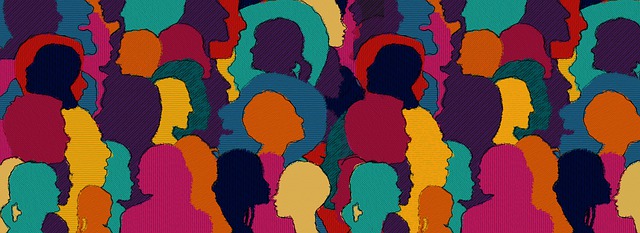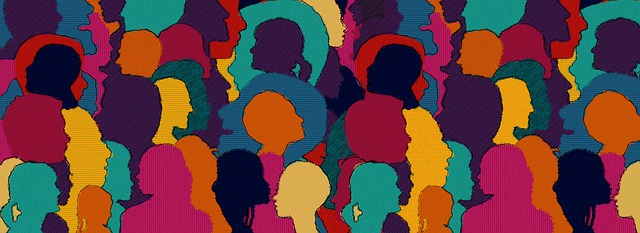To coincide with World Day of Social Justice (20th February) and International Mother Language Day (21st February), in this long read Dr Vishnu Nair and his colleague Dr Maria R Brea-Spahn at NYU Steinhardt ask key questions about a new discipline emerging within Speech and Language Therapy (SLT) programmes which is centred on social justice and diversity, equity and inclusion.

At the height of racial reckoning following the brutal killing of George Floyd in May 2020, many Speech and Language Therapy (SLT) programmes in the US and UK vowed to eradicate racism and made commitments to social and racial justice, as did wider academia. There was an explosion of listening sessions, expert panels, webinars and virtual meetings addressing the impact of racism in speech and language therapy. Topics such as implicit bias, micro-aggressions, racism, white privilege, white fragility have become part of mainstream academic debate. It appears that a new discipline centred on Social Justice and Diversity, Equity and Inclusion (DEI) is emerging within SLT. In fact, many academic conferences and journal articles are offering a significant representation of topics addressing social justice. While this trend in knowledge-creation is encouraging, one must ask ‘is there a danger in academising social justice and DEI without interrogating our knowledge and positionality, and in the absence of action and accountability?’
Asking the Unanswered Questions
Do we know enough? — History ignored
In most academic conversations in SLT, a narrow view of social justice and DEI is endorsed — one disconnected from history. While anti-racist efforts in higher education provide relevant opportunities for difficult conversations centred on equity and belonging, alone, they are insufficient at unearthing and critiquing institutions’ harmful racial-colonial historical legacies. In fact, in most cases, these initiatives appear as deliberate attempts to subdue history — especially as they fail to situate the foundation of higher education within narratives encompassing the enslavement of, violence against, and dispossession of land from indigenous people. Sharon Stein argued that there are three phases in the history of US education — the colonial era, land-grant legislation, and the post-War golden age. Albeit separated by hundreds of years, racism and disregard for Black and Brown scholarship connect these distinct times together. Even in the post-War golden age, any call for racial justice continues to be met with white fragility, hostility, and violence.
Rhodes must Fall—a global protest on social justice and decolonisation that started in 2015 at South Africa’s University of Cape Town demanded the removal of the statue of colonialist Cecil Rhodes. While Rhodes has eventually fallen in South Africa, six year later in May 2021, the University of Oxford refused to remove the statue of Rhodes from its campus. Although this decision was widely criticised, it became evident that, just like USA, UK higher education exhibits hostility towards social justice. The academy is unable to come in terms with its own violent colonial past and institutional racism.
It is easier to assume that this history is unique to the United States and the UK. On the contrary, higher education in most former European colonies was founded on the basis of Eurocentrism and European cultural transmission. In India, for instance, the architect of English education Thomas Babington Macaulay promised to create “a class of persons, Indian in blood and colour, but English in tastes, in opinions, in morals and intellect.” In other former colonised regions, such as Australia and New Zealand, the social, economic, educational and political power structures are still dominated by the imposition of coloniser cultures. Another example is the continent of Africa, where one of the primary challenges of anti-racist education is the superiority of Eurocentrism in schools that results in the de-emphasis and delegitimisation of Afrocentric world view and African knowledge systems. It is rarely acknowledged that the white man’s burden “to civilise the uncivilised” came at the cost of marginalising, undermining, and vanishing knowledge systems and traditions that were dissimilar to their own.
As celebrated author and founder of post-colonial studies Edward Said argued, it is a grave delusion to pretend that the violence of colonialism ended with the colonies reaching freedom. In fact, much of the violence that continues to take place, including the marginalisation of Black and Brown communities in education, is a direct result of colonial ideologies and practices. Higher education was built on the assumption that knowledge evolved by Black, Indigenous, and Brown communities was morally and intellectually inferior to that of the settlers. Despite varied colonial histories, a shared experience of violence and subjugation unifies Black and Brown communities.
A critical interrogation of the field of SLT would reveal problematic colonial and ableist ideologies entrenched since its very inception as a disciplinary field. St. Pierre and St. Pierre have argued that, right after the second world war, speech and language disability was treated as a threat to the colonial ambitions of economic production. The anxieties associated with the notion of speech and language disabled individuals as unproductive to the economy resulted in the correction and fixing of speech variation. In St. Pierre and St. Pierre’s own words this resulted in “calculating deviance” and “discipling the tongue” as a mechanism to control disabled subjectivity.
This critical history of SLT is rarely acknowledged in most social justice conversations. Authentic social justice and anti-racist work in SLT, then, requires a confrontation of academic histories and positionalities rooted in racism, ableism, colonialism, and imperialism. The work on social justice and liberation also demands that the field move beyond surface perusals of cultural competence checklists to ask critical questions:
Why is conversation focusing on race, colonialism, ableism absent from SLT pedagogy and research?
How do SLT (and wider university) mission, policies, and practices perpetuate the erasure of our colonial histories?
In what ways are we maintaining dominant narratives of inferiority about marginalised groups such as racialised multilinguals?
How can our pedagogies and curricula acknowledge harmful ideologies and be reimagined to foster educational excellence?
Are reconciliation and reparation possibilities in social justice and DEI work within SLT?
What voices are being centred in SLT?
We know that higher education is disproportionately represented by white women who hold enormous institutional power. In a recent article, Sana Sheikh indicated that a large group of these white educators may believe of themselves to be anti-racist allies. While well intentioned, the pedagogical and research practices of these allies protect themselves from discomfort and fail to emphasise the lived experiences and perspectives of minoritised individuals.
Like higher education, the discipline of SLT perpetuate a system that privileges and centres whiteness. While some educators in SLT affirm their allegiance to social justice, they lack an awareness that their own thinking requires decolonisation and that their practices are undermining the agency of minoritised colleagues, students and disabled individuals. This, in turn, has negative ramifications on the socio-emotional well-being of minoritised individuals, who are prevented from authentically exploring multiple facets of their intersecting identities. This lack of reflexivity and critical self-analysis of own positionalities represent a performative persona (performative allyship) to the anti-racist ally label, which, at its centre, is more concerned with the preservation of personal self-image than advocacy for justice and liberation. It is a significant structural barrier to building authentic culturally sustaining teaching or clinical practice.
Additionally, academic scholarship in SLT is colonised in that it centres white, monolingual able bodied heterosexual man as the ideal subject of human communication and cognitive ability. Norms created based on the ideas of whiteness enable colonised researchers to create knowledges and interpretations on Black and Brown identities through scientific processes, committing epistemological violence. These bodies of knowledge become legitimised science through academic publications. This knowledge treated as authentic science is then used to make inferences about and policy changes affecting marginalised individuals. A good example of this is the myth that Black and Brown students lag behind in academic achievement as determined by standardised testing. As Ibram Kendi stated, “Standardized tests have become the most effective racist weapon ever devised to objectively degrade Black and Brown minds and legally exclude their bodies from prestigious schools.”
A broader view of social justice and DEI in SLT implies the centring of culturally responsive and sustaining frameworks into pedagogical and investigative practices. And this deepening of DEI to incorporate responsiveness and sustainability into our teaching and research entails the decentring of white feelings, a shift in positionality that results in debunking the pathologising of people, phenomena, and their behaviours. It also requires the inclusion and highlighting of insider’s perspectives in the stories being told, because as Glenn Martin states: “those closest to the problem are also closest to the solution.”
Awareness, interrogation, and action: The way forward
- Social justice in education and scholarship in SLT requires an intentional disposition to practicing a “liberatory consciousness.” Key ingredients for liberatory consciousness include bringing awareness to systems of privilege and disadvantage, interrogating and analysing historical accounts and current systemic manifestations of racism and injustice, and equipping educators, scholars and students with the tools and skills to confront power structures and translate core concepts of DEI into action to advance social justice.
- Awareness would also involve acknowledging the history of violence experienced (and which continues to be experienced) by Black and Brown communities including the suppression of linguistic pluralism and indigenous linguistic genocide. It also demands a recognition that frameworks informing SLT practices are influenced by colonial ideologies, which centre ableism, whiteness, and English hegemony.
- Interrogation can include educators and researchers questioning and confronting their own positionalities within systems of power and oppression and how these positionalities impact their teaching and research. It also requires identifying and challenging the harmful ideologies (e.g. deficit mindset associated with “accented English”) infused in the curriculum and pedagogical materials.
- Action requires coalition building. It could involve the co-creation of abolitionist resource repositories and brave learning spaces by educators, researchers, clinicians, and students, who envision meaningful change for their local communities. Good examples of such coalition building is the land grab database and BLLING, a learning community that includes diverse membership.
- Coalition building would also need dreaming. A dream towards what is seemingly unattainable. Just like the celebrated Indian author Arundhati Roy – who wrote her famous essay end of imagination as a dissent against nuclear testing – we dissent by beginning a new imagination – abandoning old frames and critiquing a system that is violent towards Black and Brown bodies. We hope our voices are added to the many lenses that are still zooming to identify the shape of social justice in SLT.
Dr Vishnu Nair is Assistant Professor in the Department of Clinical Language Sciences. Dr Maria R Brea-Spahn is a Clinical Associate Professor and the Director of the Bilingual Extension Program in the Department of Communicative Sciences and Disorders at NYU Steinhardt.
This blog is an edited version of “Reimagining Diversity, Equity and Inclusion in Communication Sciences and Disorders”, a medium article written by the same authors.

